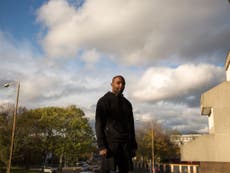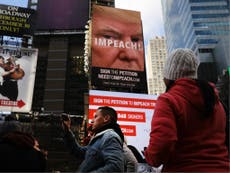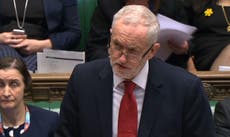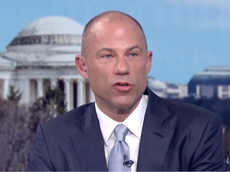Explaining the political parkour of Donald J Trump
The president has performed flip-flops and back-flips worthy of a stunt man

He runs, he tumbles, he zig-zags, spins 360 degrees, before finally – eventually – planting his feet.
Some times, Donald Trump performs so many policy pirouettes it feels like watching gymnastics; yet often, his behaviour can appear so vaulting, so reactive and so seemingly impulsive, it is more akin to political parkour.
Over the weekend, the US’s UN Ambassador Nikki Haley appeared on television to warn that Russia was to be hit with new sanctions – a statement that had presumably been agreed in advance with the White House – as part of the US’s response to the alleged chemical attack in Syria
“You will see that Russian sanctions will be coming down,” Mr Haley told CBS. “[Treasury Secretary Steve] Mnuchin will be announcing those on Monday if he hasn’t already, and they will go directly to any sort of companies that were dealing with equipment related to Assad and chemical weapons use.”
But on Monday, it emerged Trump had decided to halt the triggering of the sanctions. White House Press Secretary Sarah Huckabee Sanders said the administration was still considering the issue and a decision would be made “in the near future”. What had caused Trump to perform the about-turn? There was no answer.
Earlier, this month it was the issue of withdrawing the 2,000 US troops operating in Syria. “I want to get out, I want to bring the troops back home, I want to start rebuilding our nation,” he said.
Then there was the alleged gas attacks the multi-nation airstrikes and the claim by French leader Emanuel Macron that Trump had been persuaded to keep the troops there for the “long term”. This week, the White House said Trump still wanted to get the troops out as soon he could.
Then there was the matter of Trans-Pacific Partnership, an Asia trade agreement entered into by Barack Obama to help counter China’s growing influence. Trump decried the TPP on the campaign trail and he formally withdrew the US from it within days of taking office.
But last week, amid a mounting trade war with China, Trump said in an 11.15pm tweet that the US could try and rejoin the TPP if it was offered a deal that was “substantially better” than hammered out by his predecessor.
And so it goes, from withdrawing troops from Afghanistan to gun control, to an immigration deal for young people who entered the US without documents and whether or not be believes China is manipulating its currency, Trump has been all over the place on issues large and small.
Experts say this is probably because Trump believes a free-wheeling, react-to-the-moment approach served him well in business and during his campaign for the presidency.
“I think that Trump rules with his gut,” said Donna Hoffman, professor of political science at the University of Northern Iowa. “He thinks it served him well in business. And maybe if did work well it he New York real estate market, but that is not necessary going to work for governing.”
Hoffman said there were several downsides to Trump’s flip-flopping. His own staff often did not know where they were supposed to be on any issue and frequently found themselves being undercut, something former Secretary of State Rex Tillerson was a victim of more than once.
Moreover, the US’s traditional allies, especially those in Europe, were unsure as to whether the president was genuine in his support for institutions such as Nato. Such was Trump’s apparent disdain for Nato when he visited European leaders in the spring of 2017, German chancellor Angela Merkel said Europeans had to rely on themselves.
“The times in which we could completely depend on others are, to a certain extent, over,” she told an election rally in Munich last May. “I’ve experienced that in the last few days. We Europeans truly have to take our fate into our own hands.”
Hoffman said some Trump supporters believe this uncertainty pays off. She said she was recently at an event where she was told that Trump’s swerving and sometimes wild comments on Twitter, or even at the UN General Assembly, had resulted in North Korean leader Kim Jong-un agreeing to talks after years of stalemate. It was not her opinion, she said, but plenty shared it.
Other commentators on Trump have said his first remark on any particular comment is frequently an opening gambit or offer, as if he were still in the world of Manhattan property speculation. It is something to get the conversation started, and something from which he is willing to back away or drop, if it suits him.
In the aftermath of the of the high school shooting at Parkland, Florida, that killed 17 people and the impassioned and eloquent demand for gun law reform by the students who survived the ordeal, Trump hinted he was on their side.
At a meeting with senators during which he said he wanted to see a “comprehensive” bill, Trump mocked senators for being too afraid of the powerful National Rifle Association, a gun industry lobbying group that contributed $30m to his campaign. “Some of you people are petrified of the NRA. You can’t be petrified. You can’t be petrified,” he said.
As it was, Trump’s bluster came to little. A couple of days later, after meeting NRA officials in the Oval Office, the president declared he was no longer going to push for either universal background checks or an increase in the age-limit for buying certain weapons. “Not much political support (to put it mildly),” he said in a tweet.
Yet if Trump is so willing to give up those positions, what does it say about his core beliefs?
“He does not have core beliefs. That is one of the main differences between Pence and Trump,” said Christina Greer, associate professor of political science at Fordham University in New York.
“Pence has core beliefs, which trio might not agree with, but which he has stuck to.
“Trump does not. That is why the last person in the room who speaks to him, wins the debate. And that’s why you have people working for him clamouring to be the last person in the room.”






Join our commenting forum
Join thought-provoking conversations, follow other Independent readers and see their replies